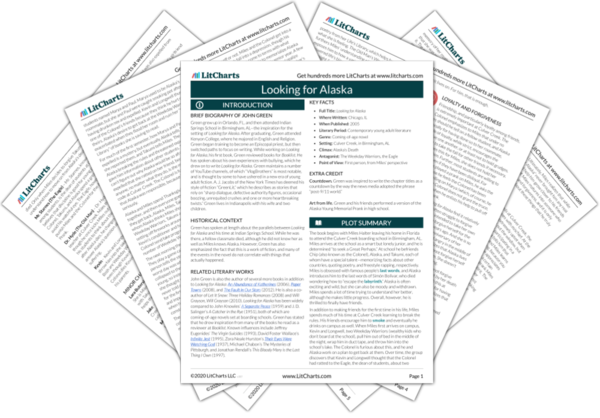Friendship, and particularly loyalty among friends, is extremely important at Culver Creek. The Colonel emphasizes to Miles that under no circumstances should he tell on a fellow student, and Alaska suffers emotionally for having done so to her roommate, Marya. This code of loyalty, while strict, encourages the students to forgive one another, or at least not to hold grudges. Friends are willing to take the fall for other friends if necessary, and when Alaska does this for Miles, she does not hold her punishment against him. Further, most students are willing to forgive one another even if they have been disloyal. For example, once Kevin has played a prank on Miles, he asks the Colonel for a truce because he feels the Colonel has been adequately punished for telling on Marya (which, of course, he did not in fact do). While the Colonel does not grant the truce, he ultimately forgives Kevin when he enlists his help to pull off the Alaska Young Memorial Prank.
But while the characters in Looking for Alaska find it relatively easy to forgive one another, they often struggle to forgive themselves. Whether or not Alaska intended to take her own life, she dies because she is unable to forgive herself for the role she played in her mother’s death years ago. And she is so furious with herself for forgetting the anniversary of her mother’s death that she drives drunk and angry in the middle of the night. When she is still alive, Miles realizes that Alaska lives so recklessly and carelessly because she cannot forgive herself for her inaction during her mother’s aneurysm. She doesn’t want to freeze again, so she is constantly moving.
Although Alaska ultimately dies because she cannot forgive herself, Miles survives the suffering brought about by her death because he can forgive himself. Miles struggles with this at first—he feels incredibly guilty and disloyal to Alaska for having let her go driving that night. However, when Miles realizes that Alaska would forgive him for letting her go, he decides to forgive himself, too. He restores his relationship with his friends and is able to escape from the grief that has consumed him.
Loyalty and Forgiveness ThemeTracker

Loyalty and Forgiveness Quotes in Looking for Alaska
“Anyway, when you get in trouble, just don’t tell on anyone. I mean, I hate the rich snots here with a fervent passion I usually reserve only for dental work and my father. But that doesn’t mean I would rat them out. Pretty much the only important thing is never never never never rat.”
“It was the central moment of Alaska’s life. When she cried and told me that she fucked everything up, I knew what she meant now. And when she said she failed everyone, I know whom she meant. It was the everything and the everyone of her life.”
“Pudge, what you must understand about me is that I am a deeply unhappy person.”
“We left.
We did not say: Don’t drive. You’re drunk.
We did not say: We aren’t letting you in that car when you are upset.
We did not say: We insist on going with you.
We did not say: This can wait until tomorrow. Anything—everything—can wait.”
“I know so many last words. But I will never know hers.”
“But we knew what could be found out, and in finding it out, she had made us closer—the Colonel and Takumi and me, anyway. And that was it. She didn’t leave me enough to discover her, but she left me enough to rediscover the Great Perhaps.”
“He was gone, and I did not have time to tell him what I had just now realized: that I forgave him, and that she forgave us, and that we had to forgive to survive in the labyrinth.”
“I would never know her well enough to know her thoughts in those last minutes, would never know if she left us on purpose. But the not-knowing would not keep me from caring, and I would always love Alaska Young, my crooked neighbor, with all my crooked heart.”
“Forgetting her mother, failing her mother and her friends and herself—those are awful things, but she did not need to fold into herself and self-destruct. Those awful things are survivable, because we are as indestructible as we believe ourselves to be. When adults say, “Teenagers think they are invincible” with that sly, stupid smile on their faces, they don’t know how right they are. We need never be hopeless, because we can never be irreparably broken.”
“So I know she forgives me, just as I forgive her. Thomas Edison’s last words were: “It’s very beautiful over there.” I don’t know where there is, but I believe it’s somewhere, and I hope it’s beautiful.”











